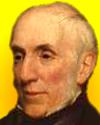 (source)
(source)
|
William Wordsworth
(7 Apr 1770 - 23 Apr 1850)
English poet who, with fellow poet Samuel Taylor Coleridge, initiated the Romantic literary era. He spent most of his life in the Lake District of England.
|
Science Quotes by William Wordsworth (24 quotes)
[Mathematics] is an independent world
Created out of pure intelligence.
Created out of pure intelligence.
— William Wordsworth
In The Prelude, Book 6, lines 186-187. [Preceding lines refer to “laws of Nature” and “a treatise of geometry.” Wordsworth did not use the word “mathematics”, which is added parenthetically to give context to the quote.]
An inventive age
Has wrought, if not with speed of magic, yet
To most strange issues. I have lived to mark
A new and unforeseen creation rise
From out the labours of a peaceful Land:
Wielding her potent enginery to frame
And to produce, with appetite as keen
As that of war, which rests not night or day.
Has wrought, if not with speed of magic, yet
To most strange issues. I have lived to mark
A new and unforeseen creation rise
From out the labours of a peaceful Land:
Wielding her potent enginery to frame
And to produce, with appetite as keen
As that of war, which rests not night or day.
— William Wordsworth
In The Excursion (1814). In The Works of William: Wordsworth (1994), Book 8, 875.
And ‘tis my faith that every flower
Enjoys the air it breathes.
Enjoys the air it breathes.
— William Wordsworth
In Lines Written in Early Spring (1798). In The Works of William Wordsworth (1994), Book 4, 482.
And from my pillow, looking forth by light
Of moon or favouring stars, I could behold
The antechapel where the statue stood
Of Newton with his prism and silent face,
The marble index of a mind for ever
Voyaging through strange seas of Thought, alone.
Of moon or favouring stars, I could behold
The antechapel where the statue stood
Of Newton with his prism and silent face,
The marble index of a mind for ever
Voyaging through strange seas of Thought, alone.
— William Wordsworth
'Residence at Cambridge', The Prelude, or, Growth of a Poet's Mind: An Autobiographical Poem (1850), Book 3, 57-58.
And yet the books which then I valued most
Are dearest to me now; for, having scanned,
Not heedlessly, the laws, and watched the forms
Of Nature, in that knowledge I possessed
A standard, often usefully applied,
Even when unconsciously, to things removed
From a familiar sympathy.
Are dearest to me now; for, having scanned,
Not heedlessly, the laws, and watched the forms
Of Nature, in that knowledge I possessed
A standard, often usefully applied,
Even when unconsciously, to things removed
From a familiar sympathy.
— William Wordsworth
From 'The Prelude' in Book 5, collected in Henry Reed (ed.), The Complete Poetical Works of William Wordsworth (1851), 503.
Art thou the bird whom Man loves best,
The pious bird with the scarlet breast,
Our little English Robin;
The bird that comes about our doors
When autumn winds are sobbing?
The pious bird with the scarlet breast,
Our little English Robin;
The bird that comes about our doors
When autumn winds are sobbing?
— William Wordsworth
From poem, 'The Redbreast and Butterfly', collected in The Poetical Works of William Wordsworth: Complete in One Volume (1828), 72.
Babylon,
Learned and wise, hath perished utterly,
Nor leaves her speech one word to aid the sigh
That would lament her.
Learned and wise, hath perished utterly,
Nor leaves her speech one word to aid the sigh
That would lament her.
— William Wordsworth
From poem, 'Missions And Travels', collected in The Poetical Works of William Wordsworth: Complete in One Volume (1828), 176.
Call Archimedes from his buried tomb
Upon the plain of vanished Syracuse,
And feelingly the sage shall make report
How insecure, how baseless in itself,
Is the philosophy, whose sway depends
On mere material instruments—how weak
Those arts, and high inventions, if unpropped
By virtue.
Upon the plain of vanished Syracuse,
And feelingly the sage shall make report
How insecure, how baseless in itself,
Is the philosophy, whose sway depends
On mere material instruments—how weak
Those arts, and high inventions, if unpropped
By virtue.
— William Wordsworth
In 'The Excursion', as quoted in review, 'The Excursion, Being a Portion of the Recluse, a Poem, The Edinburgh Review (Nov 1814), 24, No. 47, 26.
Come forth into the light of things,
Let Nature be your Teacher.
Let Nature be your Teacher.
— William Wordsworth
In 'The Tables Turned' (1798). ln The Works of William Wordsworth (1994), Book 4, 381.
Come forth into the light of things,
Let Nature be your teacher. …
One impulse from a vernal wood
May teach you more of man,
Of moral evil and of good,
Than all the sages can.
Let Nature be your teacher. …
One impulse from a vernal wood
May teach you more of man,
Of moral evil and of good,
Than all the sages can.
— William Wordsworth
From poem, 'The Tables Turned', collected in Lyrical Ballads, With a Few Other Poems (1798), 187.
Continuous as the stars that shine
And twinkle on the milky way,
They stretch’d in never-ending line
Along the margin of a bay:
Ten thousand saw I at a glance
Tossing their heads in sprightly dance.
And twinkle on the milky way,
They stretch’d in never-ending line
Along the margin of a bay:
Ten thousand saw I at a glance
Tossing their heads in sprightly dance.
— William Wordsworth
Second verse of poem, 'I Wandered Lonely as a Cloud', In Poems: Including Lyrical Ballads: In two Volumes (1815), Vol. 1, 328.
Dear Sir Walter ... Your account of his seizure grieved us all much. Coleridge had a dangerous attack a few weeks ago; Davy is gone. Surely these are men of power, not to be replaced should they disappear, as one alas has done.
— William Wordsworth
From letter to Samuel Rogers (30 Jul 1830), collected in Peter William Clayden, Rogers and His Contemporaries (1889), Vol. 2, 41. Also Quoted in Raymond Lamont-Brown, Humphry Davy: Life Beyond The Lamp (2004), 168.
I traveled among unknown men,
In lands beyond the sea;
Nor England! did I know till then
What love I bore to thee.
In lands beyond the sea;
Nor England! did I know till then
What love I bore to thee.
— William Wordsworth
First verse of poem, 'I Travelled among Unknown Men', In Poems: In Two Volumes (1807), Vol. 1, 68.
Let Nature be your teacher
— William Wordsworth
In poem, 'The Tables Turned: An evening Scene, on the Same Subject', Lyrical Ballads: With a Few Other Poems (1798), 187.
Lost in a gloom of uninspired research.
— William Wordsworth
In The Excursion (1814). In The Works of William Wordsworth (1994), Book 4, 810.
Man now presides
In power, where once he trembled in his weakness;
Science advances with gigantic strides;
But are we aught enriched in love and meekness?
In power, where once he trembled in his weakness;
Science advances with gigantic strides;
But are we aught enriched in love and meekness?
— William Wordsworth
In To the Planet Venus (1838). In The Works of William Wordsworth (1994), Book 4, 281.
May no rude hand deface it,
And its forlorn “Hic jacet!”
And its forlorn “Hic jacet!”
— William Wordsworth
Last lines of poem 'Ellen Irwin, or the Braes of Kirtle', collected in The Poetical Works of William Wordsworth: Complete in One Volume (1828), 127. Note: The Latin words, “Hic jacet” mean “Here lies!”
https://books.google.com/books?id=Zi9ZNlSGBqoC
William Wordsworth - 1828 -
On poetry and geometric truth,
And their high privilege of lasting life,
From all internal injury exempt,
I mused; upon these chiefly: and at length,
My senses yielding to the sultry air,
Sleep seized me, and I passed into a dream.
And their high privilege of lasting life,
From all internal injury exempt,
I mused; upon these chiefly: and at length,
My senses yielding to the sultry air,
Sleep seized me, and I passed into a dream.
— William Wordsworth
From 'The Prelude' in Book 5, collected in Henry Reed (ed.), The Complete Poetical Works of William Wordsworth (1851), 497.
Sweet is the lore which Nature brings;
Our meddling intellect
Mis-shapes the beauteous forms of things
We murder to dissect.
Enough of Science and of Art;
Close up these barren leaves;
Come forth, and bring with you a heart
That watches and receives.
Our meddling intellect
Mis-shapes the beauteous forms of things
We murder to dissect.
Enough of Science and of Art;
Close up these barren leaves;
Come forth, and bring with you a heart
That watches and receives.
— William Wordsworth
In poem, 'The Tables Turned: An Evening Scene, on the Same Subject', Lyrical Ballads: With a Few Other Poems (1798), 188.
The remotest discoveries of the Chemist, the Botanist, or the Mineralogist, will be as proper objects of the Poet’s art as any upon which it can be employed, if the time should ever come when these things shall be familiar to us, and the relations under which they are contemplated by the followers of these respective sciences shall be manifestly and palpably material to us as enjoying and suffering beings.
— William Wordsworth
In W. J. B. Owen (ed.), Preface to the Lyrical Ballads (1800, 1957), 124-125.
Those to whom the harmonious doors
Of Science have unbarred celestial stores,
To whom a burning energy has given
That other eye which darts thro’ earth and heaven,
Roams through all space and unconfined,
Explores the illimitable tracts of mind,
And piercing the profound of time can see
Whatever man has been and man can be.
Of Science have unbarred celestial stores,
To whom a burning energy has given
That other eye which darts thro’ earth and heaven,
Roams through all space and unconfined,
Explores the illimitable tracts of mind,
And piercing the profound of time can see
Whatever man has been and man can be.
— William Wordsworth
In An Evening Walk (1793). In E. de Selincourt (ed.), The Poetical Works of William Wordsworth (1940), Vol. 1, 13.
To every Form of being is assigned’
Thus calmly spoke the venerable Sage,
An active Principle:—howe’er remove!
From sense and observation, it subsists.
In all things, in all natures; in the stars
Of azure heaven, the unenduring clouds,
In flower and tree, in every pebbly stone
That paves the brooks, the stationary rocks,
The moving waters, and the invisible air.’
Thus calmly spoke the venerable Sage,
An active Principle:—howe’er remove!
From sense and observation, it subsists.
In all things, in all natures; in the stars
Of azure heaven, the unenduring clouds,
In flower and tree, in every pebbly stone
That paves the brooks, the stationary rocks,
The moving waters, and the invisible air.’
— William Wordsworth
In The Excursion (1814). In The Works of William Wordsworth (1994), Book 9, 884.
To the solid ground Of Nature trusts the mind which builds for aye.
[From the first issue, and for over one hundred years, this quote appeared under the masthead of Nature journal. 'Aye' is an archaic word meaning 'always'.]
[From the first issue, and for over one hundred years, this quote appeared under the masthead of Nature journal. 'Aye' is an archaic word meaning 'always'.]
— William Wordsworth
From Sonnet 36, Poetical Works (1827), Vol. 2, 290. Reference to masthead from nature.com website.
We have no knowledge, that is, no general principles drawn from the contemplation of particular facts, but what has been built up by pleasure, and exists in us by pleasure alone. The Man of Science, the Chemist and Mathematician, whatever difficulties and disgusts they may have had to struggle with, know and feel this. However painful may be the objects with which the Anatomist's knowledge is connected, he feels that his knowledge is pleasure; and where he has no pleasure he has no knowledge.
— William Wordsworth
In Lyrical Ballads: With Pastoral and Other Poems (3rd Ed., 1802), Vol. 1, Preface, xxxiv.
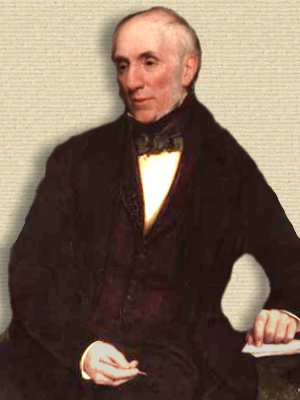

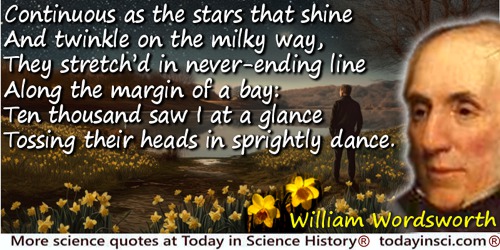
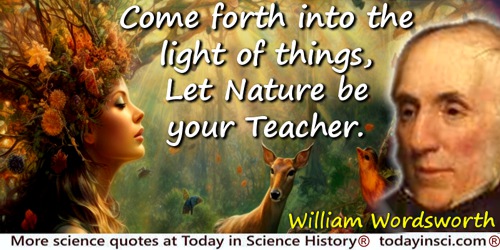

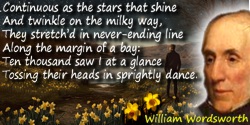

 In science it often happens that scientists say, 'You know that's a really good argument; my position is mistaken,' and then they would actually change their minds and you never hear that old view from them again. They really do it. It doesn't happen as often as it should, because scientists are human and change is sometimes painful. But it happens every day. I cannot recall the last time something like that happened in politics or religion.
(1987) --
In science it often happens that scientists say, 'You know that's a really good argument; my position is mistaken,' and then they would actually change their minds and you never hear that old view from them again. They really do it. It doesn't happen as often as it should, because scientists are human and change is sometimes painful. But it happens every day. I cannot recall the last time something like that happened in politics or religion.
(1987) -- 


